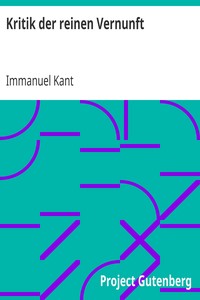Kritik der reinen Vernunft: (Erste Fassung 1781)
Author: Immanuel Kant
Bookshelves: Philosophy & Ethics, Psychiatry/Psychology, Religion/Spirituality/Paranormal, DE Sachbuch, German Language Books, Philosophy

Summary
"Kritik der reinen Vernunft" by Immanuel Kant is a foundational philosophical work written in the late 18th century. This critical examination aims to analyze the relationship between human experience and knowledge, particularly addressing the capabilities and limits of pure reason. Kant explores the means through which knowledge is acquired, distinguishing between different forms of judgment and the implications they hold for metaphysics and epistemology. The opening of this work sets the stage for Kant's ambitious project. Kant introduces the notion that human reason encounters insurmountable questions within metaphysics but fails to find satisfactory answers to them. He discusses the importance of understanding how we arrive at knowledge - especially knowledge that is independent of empirical experience (a priori). In this context, he presents the difference between analytical and synthetic judgments, emphasizing the need for a critique of pure reason to delineate the sources, extent, and validity of our knowledge. This introductory analysis is essential for understanding the broader inquiries that Kant will undertake in subsequent sections regarding the foundations of human understanding and the frameworks of reality that govern our experiences. (This is an automatically generated summary.)
 LibraryManager
LibraryManager